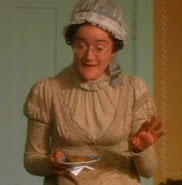On the one hand, this moment can be utterly satisfying, as when Darcy tells Miss Bingley, "It is many months since I have considered [Miss Elizabeth Bennet] one of the handsomest women of my acquaintance."
It is satisfying because it reveals Darcy's growing affection for Elizabeth. It is also satisfying because Miss Bingley is the kind of sly bully who hunts for a picayune flaw and then exploits it. She needs to be stopped! (And she brings Darcy's rebuttal on herself by needling him.)
Anthony in the Bridgerton series delivers a similar set-down to a bullying socialite; the defended characters see him as entirely heroic.
On the other hand, the trope of "telling off the villains" has two problems:1. Villainy is sometimes subjective. (Sometimes, it isn't. Some behavior is simply wrong. But often, in interpersonal communication, it is "in the eye of the beholder.")
Sharp-witted Emma gets irritated by Miss Bates's meanderings, but Emma's mocking set-down of Miss Bates in public is "badly done." Emma has become the villain.
Likewise, although the scene in the Bridgerton series is well-conveyed and quite short, Darcy's is better because Darcy concentrates on the positive--he doesn't tell Miss Bingley what he thinks of her. "Tearing a strip" off someone at a house party is kind of mean, no matter who that person is. And Mr. Knightly's scolding of Emma is only tolerable because Emma truly has crossed a line and gone all "mean girl." (And Mr. Knightly does later apologize.)
2. Yelling at people is counterproductive.
In any case, Rochester doesn't appear to notice Blanche's behavior, he is so consumed with trying to figure out Jane's. Eventually, he throws all his guests out--which is arguably rude but at least more effective than critiquing someone's character to that person's face.
Consider that Jane wishes St. John Rivers well despite his attempt to self-righteously dominate her. What good would castigating him to his face do? The guy is already a few coconuts shy of a full-load. Better for Jane to simply leave.
So the "telling off trope" can be satisfying but sometimes, it can backfire.
And sometimes, "when the going gets tough, the tough leave."



